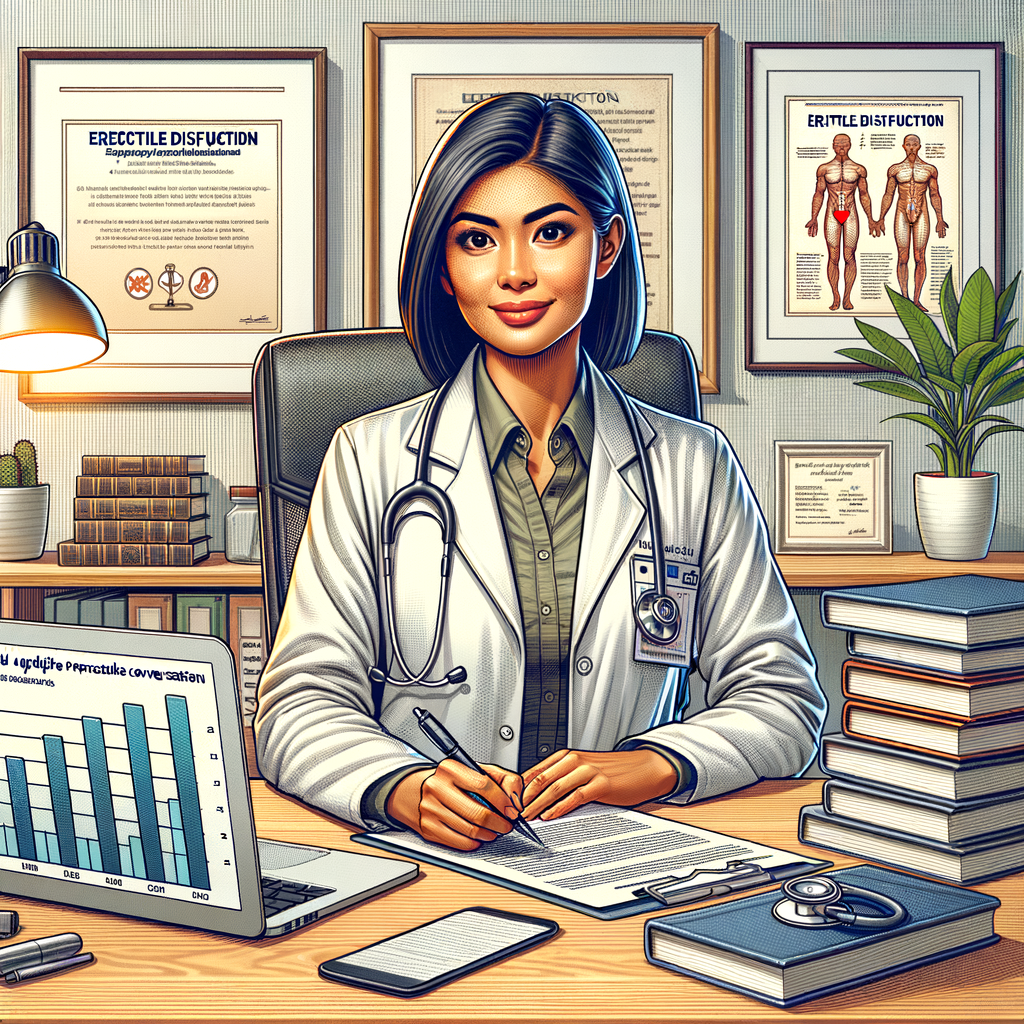- Understanding Erectile Dysfunction
- Signs and Symptoms of Erectile Dysfunction
- Causes of Erectile Dysfunction
- Seeking Professional Help for Erectile Dysfunction
- Lifestyle Changes and Strategies for Erectile Dysfunction
- Communicating with Partners about Erectile Dysfunction
- Overcoming Psychological Barriers to Discussing Erectile Dysfunction
- Using Technology and Resources for Support
- FAQs about Erectile Dysfunction
- References
Understanding Erectile Dysfunction
Erectile dysfunction (ED) is a common condition that affects many men at some point in their lives. It refers to the inability to achieve or maintain an erection sufficient for sexual activity. While it can be a sensitive topic, it’s essential to approach conversations about ED with openness and empathy.
Men experiencing ED may feel embarrassed or anxious about discussing it, but it’s crucial to remember that it is a medical condition that can often be treated successfully. By approaching the topic with understanding and compassion, you can create a supportive environment for discussing this issue.
Signs and Symptoms of Erectile Dysfunction
Recognizing the signs and symptoms of ED is the first step in addressing the issue. Some common indicators include difficulty achieving an erection, maintaining an erection, or experiencing a reduced sexual desire. It is important to note that occasional difficulty with erections is normal and does not necessarily indicate a medical problem. However, persistent issues may warrant a conversation with a healthcare professional.
If you or your partner is experiencing symptoms of ED, it is essential to seek advice from a doctor. A healthcare provider can help determine the underlying causes of ED and recommend appropriate treatment options. Open communication about symptoms and concerns is key to finding effective solutions for addressing erectile dysfunction.
Causes of Erectile Dysfunction
ED can be caused by a variety of factors, including physical, psychological, and lifestyle issues. Common physical causes include diabetes, heart disease, high blood pressure, obesity, and certain medications. Psychological factors such as stress, anxiety, and depression can also contribute to ED. Lifestyle factors like smoking, excessive alcohol consumption, and lack of physical activity can further exacerbate the condition.
Addressing the root cause of ED is essential for effective treatment. By discussing these factors openly with a healthcare provider, tailored treatment plans can be developed to address the specific underlying issues contributing to erectile dysfunction. Open and honest conversations with a doctor can help identify the most suitable treatment options for individual circumstances.
Seeking Professional Help for Erectile Dysfunction
If you or your partner are experiencing symptoms of ED, it’s important to consult a healthcare professional for proper diagnosis and treatment. Your doctor can perform a physical examination, review your medical history, and may recommend additional tests to identify the underlying causes of erectile dysfunction.
Treatment options for ED may vary depending on the specific causes and individual preferences. Your doctor may suggest lifestyle changes, medications, therapy, or other interventions to address the condition effectively. By discussing your concerns openly with a healthcare provider, you can work together to find the best approach for managing ED and improving sexual health.
Lifestyle Changes and Strategies for Erectile Dysfunction
In addition to medical interventions, making certain lifestyle changes can also help manage erectile dysfunction. Maintaining a healthy diet, regular exercise, managing stress, quitting smoking, and moderating alcohol intake can all contribute to improving sexual function.
Engaging in regular physical activity, such as cardiovascular exercise, can promote blood flow and overall health, which may positively impact erectile function. Additionally, addressing any underlying health conditions, such as diabetes or high blood pressure, can also help improve ED symptoms. By incorporating these lifestyle changes into your routine, you can proactively manage erectile dysfunction and support overall well-being.
Communicating with Partners about Erectile Dysfunction
Open and honest communication with your partner is crucial when addressing issues of erectile dysfunction. It can be challenging to discuss ED, but sharing your concerns and feelings with your partner can help strengthen your relationship and alleviate stress and anxiety.
Approach the conversation with empathy, understanding, and a willingness to listen. Be patient and supportive, and encourage your partner to express their thoughts and feelings openly. By working together as a team, you can navigate the challenges of ED and find solutions that work for both of you. Remember, intimacy is about emotional connection as much as physical, and maintaining open communication is essential for a healthy relationship.
Overcoming Psychological Barriers to Discussing Erectile Dysfunction
Many men may experience psychological barriers when it comes to discussing erectile dysfunction. Feelings of shame, embarrassment, or inadequacy can often prevent individuals from seeking help. However, it’s important to remember that ED is a common medical condition and seeking treatment is a proactive step towards improving your sexual health and overall well-being.
By acknowledging and addressing any negative emotions surrounding ED, you can help break down psychological barriers and create a more open environment for discussing this issue. Seeking support from a healthcare provider, therapist, or support group can also provide valuable resources and guidance for managing psychological aspects of erectile dysfunction.
Using Technology and Resources for Support
In today’s digital age, there are numerous resources and technological advancements available to support individuals dealing with erectile dysfunction. Online platforms, apps, and telemedicine services offer convenient ways to connect with healthcare providers, access information, and seek support from the comfort of your own home.
Additionally, educational websites, forums, and online communities provide valuable insights, tips, and personal stories from others navigating similar challenges. By utilizing these digital resources, you can empower yourself with knowledge, connect with peers, and access the support you need to address erectile dysfunction effectively.
FAQs about Erectile Dysfunction
1. Q: Is erectile dysfunction a common condition?
A: Yes, erectile dysfunction is a common issue that affects many men at some point in their lives.
2. Q: Can emotional stress contribute to erectile dysfunction?
A: Yes, emotional stress, anxiety, and depression can be underlying factors in ED.
3. Q: Are there lifestyle changes that can help improve erectile dysfunction?
A: Yes, maintaining a healthy lifestyle, including regular exercise and a balanced diet, can positively impact ED.
4. Q: Are there specific medications that can cause erectile dysfunction?
A: Yes, certain medications, such as antidepressants and blood pressure medications, may contribute to ED as a side effect.
5. Q: Is age a significant factor in developing erectile dysfunction?
A: While age can be a factor, ED can occur in men of all ages due to various causes.
6. Q: How important is it to seek medical advice for erectile dysfunction?
A: Seeking medical advice is crucial for proper diagnosis and treatment of erectile dysfunction.
7. Q: Can erectile dysfunction be a symptom of an underlying health condition?
A: Yes, ED can sometimes be a sign of an underlying health issue such as heart disease or diabetes.
8. Q: Are there alternative treatments available for erectile dysfunction?
A: Yes, alternative therapies such as acupuncture or herbal supplements may be considered, but it’s important to consult with a healthcare provider.
9. Q: Can psychological counseling help with erectile dysfunction?
A: Yes, therapy or counseling can be beneficial in addressing psychological factors contributing to ED.
10. Q: How can partners support each other when dealing with erectile dysfunction?
A: Partners can offer emotional support, encourage open communication, and explore treatment options together to navigate ED as a team.
By proactively addressing erectile dysfunction through open discussions, seeking professional advice, and exploring lifestyle and treatment options, individuals can effectively manage this common condition and improve their overall sexual health. Remember, you are not alone in facing this issue, and support is available to help you navigate this journey towards a fulfilling and satisfying intimate life.
References
1. The American Urological Association. (2021). Erectile Dysfunction. https://www.auanet.org/guidelines/erectile-dysfunction
2. Mayo Clinic. (2021). Erectile Dysfunction. https://www.mayoclinic.org/diseases-conditions/erectile-dysfunction
3. Cleveland Clinic. (2021). Erectile Dysfunction. https://my.clevelandclinic.org/health/diseases/9848-erectile-dysfunction



